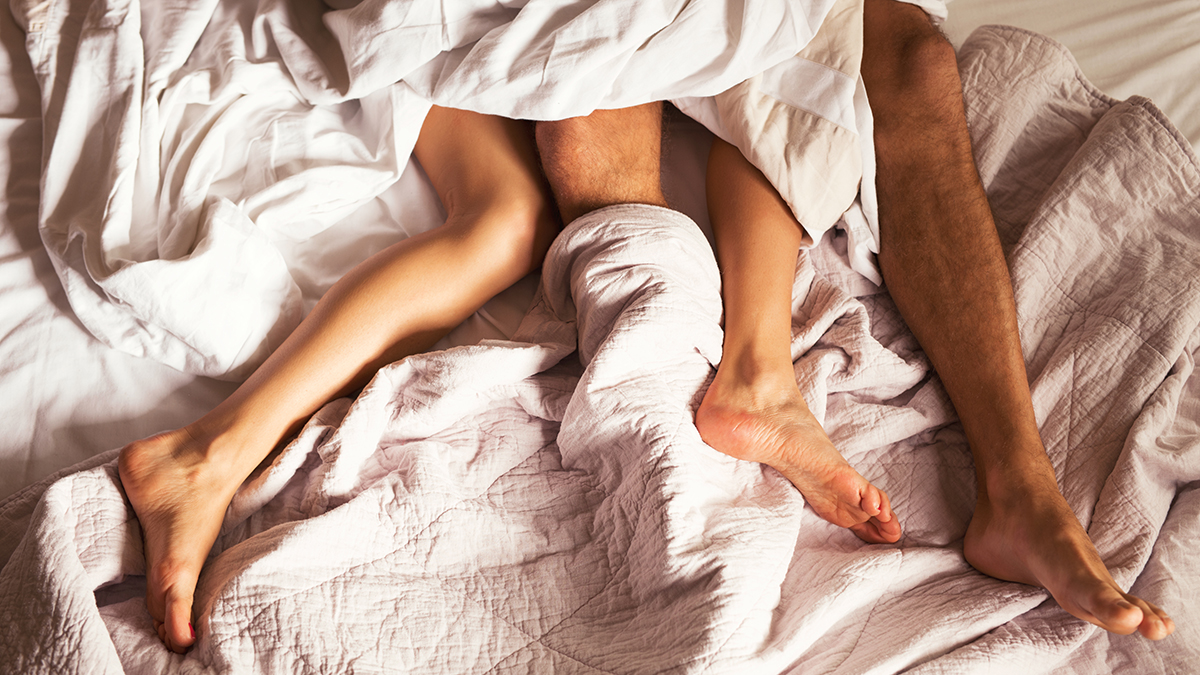Love & Slumber | Sleeping Alone Vs Sharing a Bed

A restful night’s sleep is the cornerstone to good health and great performance. But how does the presence of someone on the other side of the bed affect your slumber? Here’s what you need to know about the consequences of sleeping alone and sharing your sheets.
The perks of being a little spoon
Various strands of research have found people to sleep better when sharing the bed with a loved one. One multiyear study conducted by the University of Pittsburgh School of Medicine determined women in stable, long-term relationships to sleep better than single women, for instance. Another, from the University of Utah, found sleep issues to be greater in people temporarily sleeping alone while separated from their bed partner (when on a business trip, for example), with a dramatic decline in said issues when a couple is reunited.
Just as romantic are findings published in the journal Psychosomatic Medicine. Researchers asked 29 couples to keep diaries of experiences with their partner alongside sleep habits. They found that, on days when women reported more positive interactions with their partner, they slept more efficiently. A rather cute sub-discovery was that men slept better when their partners reported those positive experiences, too.
But while these psychological factors are anecdotal, there is an altogether more biological reason why people who share a bed are likely to register more hours of shut-eye: sex. The National Sleep Foundation credits sex with falling asleep easier thanks to its ability to boost oxytocin, aka the “love” or “cuddle” hormone, while lowering cortisol, the stress hormone. While these hormones are shown to bring forward sleep onset times in both genders, in women, sex also raises estrogen levels, improving the deeper REM stage of sleep as a result. A study conducted by the Morehouse School of Medicine in Atlanta, Georgia has even credited sex with positively influencing circadian rhythm.
But a lot of the benefits regarding circadian rhythm come from how a partner tends to act as a social time-keeper. They influence things like meal times and pre-bedtime rituals, which are factors shown to have a significant impact on our internal body clock. A 1991 study published in the journal Marital Therapy Research even suggested that couples who displayed similarities in their sleep-wake rhythms were likely to be more satisfied in their relationship.
In defence of sleeping alone
On the other side of the pillow, things aren’t always dream-like in the world of coupled sleeping. For starters, in the same vein that happy couples with positive interactions might sleep better, the opposite is reported to be true of those worrying about a partner’s availability.
Then there’s the fact that these days, an estimated 25 per cent of people who live with their significant other sleep in separate beds in the pursuit of a more restful night’s sleep. Statistically speaking, this is particularly true of women, and there’s a simple reason for that: men snore more.
Therein lies the biggest positive of sleeping alone: peace and quiet. Despite the reported emotional peace of mind, sleeping side-by-side is shown to yield 50 per cent more nightly disturbances. Snoring is twice as common among men. Mixed with the fact that traditionally, caring for infants has fallen on women rendering them lighter sleepers evolutionarily, sleeping with someone else in your bed might not be the psychology-backed recipe for a restful night it’s made out to be.
And snoring isn’t the only fall-out couples have between the sheets. The regulation of body temperature is also more easily compromised when sleeping with another and is said to be at the top of the list of bed-sharer complaints by sleep.org. Not far off is disturbance from restlessness, which can be amplified by too-small or springy a mattress. It’s where new tech developments like The Pod by Eight Sleep – a foam-blend mattress that dynamically warms/cools dependent on a set optimal body temperature – come into their own.
The verdict
There’s no one-size-fits-all answer as to whether having a sleeping partner will improve or inhibit sleep. Though the psychological studies which focus on emotion point to a serious upside from hitting the hay with someone at your side, cohabiting couples who choose to sleep apart for the sake of their sleep go to show these results don’t ring true for everyone.
As sleep tech progresses, annoyances such as restlessness and snoring will likely diminish, and this debate might lean ever so slightly in favour of partnered sleeping. Now, we’re partial to going to lifestyle-changing lengths in the pursuit of better sleep here at Form towers, but we will say this. Fast-tracking a relationship based on potentially-enhanced shut-eye is, most definitely, a step too far.
_
Regardless of who you do or don’t share a bed with, Form’s ZZZZs nootropic supplement promotes a restful and regenerative night’s sleep by combining 5-HTP with calming amino acids and the dietary minerals Magnesium and Zinc. 5-HTP is the precursor to serotonin, the neurotransmitter responsible for happiness. Because of this role in creating serotonin, 5-HTP is also indirectly involved in producing melatonin, a hormone that helps the body’s bio clock stay in sync and regulates daily sleep-wake cycles.


















